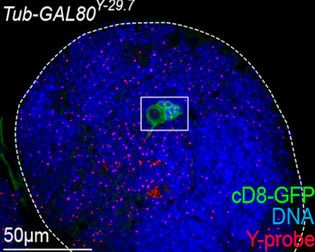Defects in the various cellular mechanisms that prevent mutations and chromosomal abnormalities can lead to genomic instability, which is associated with a wide variety of diseases, such as ataxia telangiectasia, xeroderma pigmentosum, and cancer.

Our laboratory uses Drosophila as an experimental model to understand the causes and consequences of GI. In collaboration with the laboratory of Dr. Renata Basto (Curie Institute, Paris) we have developed a tool to investigate genomic instability. This tool consists in transgenic flies carrying reporters engineered such that a fluorescent signal is turned on only in cells in which genome integrity is compromised. The key to this reporter system is a protein called Gal80. Mutation in the gene that encodes this protein or loss of the chromosome carrying this gene act as molecular triggers that lead to the expression of a fluorescent protein.
These are highly sensitive reporters that can detect cases of GI affecting a single cell in the entire organism. We are currently taking advantage of these reporters to investigate different issues regarding genetic instability including GI contribution to malignant growth, sex-biased differences, and others.
While quantifying background levels of genomic instability in normal healthy flies carrying our reporters, we confirmed that fluorescent cells were very rare indeed in most developing tissues. However, unexpectedly, we found that fluorescent neural stem cells were present in the central brain in most individuals. Even more unexpectedly, further molecular analysis demonstrated that in these cells, fluorescence did not result from chromosome loss or mutations in the Gal80 gene.
We have named this new type of epigenetic loss of Gal80 activity ‘Illuminati’. We have found that Illuminati is different to other epigenetic mechanism of gene inactivation known in Drosophila and that it is sensitive to conditions such as diet and temperature. Notably, Illuminati is strongly enhanced in malignant tumours that originate in neural stem cells.
We conclude that Illuminati identifies a previously unknown type of functional instability, which is not due to genomic instability, that may have important implications in development and disease.
PUBLISHED IN: Molnar C., Reina J., Herrero A., Heinen J.P., Méndiz V., Bonnal S., Irimia M, Sánchez-Jiménez M., Sánchez-Molina S., Mora J., and Gonzalez C (2022). Human EWS-FLI protein recapitulates in Drosophila the neomorphic functions that induce Ewing sarcoma tumorigenesis. PNAS Nexus, pgac222, https://doi.org/10.1093/pnasnexus/pgac222
